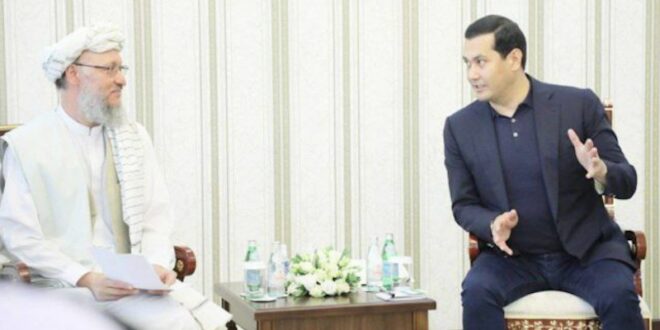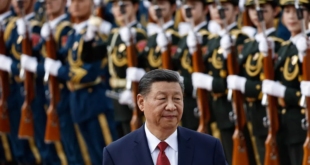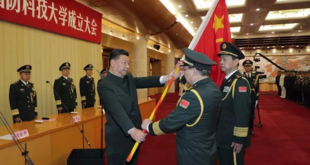Since the Taliban seized control of Afghanistan in mid-August, it has struggled to win friends. Achieving international recognition and acceptance still remains an uphill challenge, subject to its ability and, perhaps, willingness to meet the international community’s expectations. The ultra-conservative Islam the Taliban preaches and wants to reinstall in Afghanistan could possibly find acceptance among some Middle Eastern monarchies or even (on some level) by the Shiite theocracy next door, in Iran. However, few would have expected that the strongly secularist government of Uzbekistan, which has been suppressing radical Islamism at home for many years, would emerge as one of the Taliban’s most vocal advocates. Now, Tashkent is calling on Western countries to unfreeze billions of dollars of international aid assigned to the previous government of Afghanistan (Vzglyad, September 17).
Uzbekistani officials argue that isolating the “Taliban 2.0” regime and turning it into another “hermit kingdom” will only lead to negative consequences for both Afghanistan and the international community. They argue that close trans-border engagement and cooperation is essential to prevent Afghanistan from again becoming a failed state that violates its people’s rights and a “safe haven” for international terrorists (Gazeta.uz, October 8).
Though security and humanitarian concerns have always featured prominently in Uzbekistan’s relations with Afghanistan, at the core of Tashkent’s new pragmatic approach, adopted by President Shavkat Mirziyoyev toward successive Afghan governments, are economic interests, which include an aspiration not to lose the hard-won niches in the Afghan market that Uzbekistani businesses acquired over previous years. In 2020, bilateral trade between the two countries reached $779 million, more than 90 percent of which was Uzbekistani exports (Review.uz, July 7).
Perhaps for these reasons, Uzbekistani officials have stepped up the intensity of their meetings with Taliban officials. On October 7, Uzbekistan’s Foreign Minister Abdulaziz Kamilov visited Kabul to meet with senior Taliban government representatives and discuss bilateral cooperation related to trade, energy and transit issues. This was the most senior Uzbekistani delegation to visit Kabul since the Taliban came to power (Mfa.uz, October 7).
Kamilov sat down with the Islamic Emirate of Afghanistan’s deputy prime ministers Abdul Salam Hanafi, who handles economic matters, and Mohammed Abdul Kabir, in charge of political issues. Their meeting was also attended by Alhaj Hamidullah Akhundzada, the Afghan minister of transport and civil aviation; Abdul Latif Mansur, the minister of energy and water; and Abdul Manan Omari, the minister of public works. In a separate gathering, Foreign Minister Kamilov met with his local counterpart, Amir Khan Muttaqi (Mfa.uz, October 7).
According to Kamilov, during his discussions in Kabul, Taliban officials once again reiterated their pledge that Afghanistan under their rule would not pose any security threats to its neighbors, including Uzbekistan. Moreover, the Taliban representatives assured the visiting delegation that the official status of the Uzbek language, spoken by the sizable ethnic-Uzbek minority (around 10 percent) of Afghanistan, will be preserved. Finally, Kamilov’s hosts in Kabul pledged to repay the accumulated debt for electricity supplied by Uzbekistan at the earliest possible date, once the Taliban government could access Afghanistan’s currently frozen international financial assets. So far, Tashkent accepts the Taliban’s promises and has not interrupted electricity supplies. Uzbekistan plays a leading role in Afghanistan’s electricity market, covering 52 percent of the latter country’s electricity imports (Gazeta.uz, October 7).
The following week, on October 16, as agreed by Kamilov and his Taliban interlocutors, a high-level Afghan delegation, led by Deputy Prime Minister Hanafi, an ethnic Uzbek, visited Uzbekistan’s border city of Termez to continue the bilateral discussion on the issues of trade, transit and energy (Mift.uz, October 16). According to Uzbekistani officials, construction of the multi-billion dollar Termez–Mazari–Sharif–Kabul–Peshawar railway line and the Surkhan–Puli–Khumri power line featured prominently during the negotiations. Both sides agreed to jointly pursue these strategically important projects, first agreed upon during the administration of former president Ashraf Ghani, even though Uzbekistan has not yet extended formal recognition to the Taliban government (Mift.uz, October 16).
The importance of these two infrastructure projects cannot be overestimated for double landlocked Uzbekistan. During his presidential campaign tour around the country, Mirziyoyev notably talked about the situation in Afghanistan and once again underlined the importance of implementing the Termez–Mazari–Sharif–Kabul–Peshawar railway line. For example, while visiting Navoi province in northwestern Uzbekistan, Mirziyoyev praised himself for establishing contact with the Taliban in 2019, before the militant group seized power, and claimed that this decision has been validated by recent developments (Kun.uz, October 13).
During another pre-election campaign visit, to Karshi city, in the southwest of the country, the incumbent president underlined that the construction of the trans-Afghan railway line to Pakistani ports was an important issue for Uzbekistan. In particular, he said that no matter who rules Afghanistan, if that government thinks about its people’s interests and economic development, it will understand the importance of implementing this railroad project. According to Mirziyoyev, the Taliban leadership also eagerly wants to implement this railway; however, without international recognition for the Taliban regime, this kind of big project cannot be implemented as nobody will be willing to provide financial support (Kun.uz, October 12).
Mirziyoyev claimed his government’s efforts to implement this transit project are already paying off. Since construction in Uzbekistan began, some neighboring countries that host alternative railway corridors offered to reduce their service fees and tariffs, thus lowering transport costs for Uzbekistani businesses (Kun.uz, October 12).
With no short-term prospects of the United States formally recognizing the Taliban government or unfreezing Afghanistan’s financial assets, the Taliban has been reaching out to the US’s main geopolitical rivals, Russia and China. Talks with Russia have not gone beyond lectures on forming an inclusive government and the need to stamp out terrorist groups operating inside Afghanistan. The Kremlin also made clear it has no intention of providing financial assistance to Afghanistan. Meanwhile, occasional Chinese or Pakistani monetary handouts constitute only a fraction of what Afghanistan used to receive from Washington and its European allies (Kun.uz, October 20).
The cash-strapped Taliban government is, thus, currently grappling with immediate day-to-day challenges of survival, first and foremost preventing the onset of famine or a humanitarian crisis. In such circumstances, plans to implement major infrastructure projects will remain on the drawing board for the foreseeable future. However, consistent attempts by the government of Uzbekistan to promote peace and stability in Afghanistan, and Tashkent’s willingness to deal with any government in place in Kabul, regardless of ideological or political preferences, may help Uzbekistan successfully promote and develop its own economic interests.
 Eurasia Press & News
Eurasia Press & News




